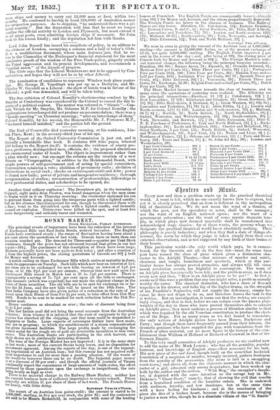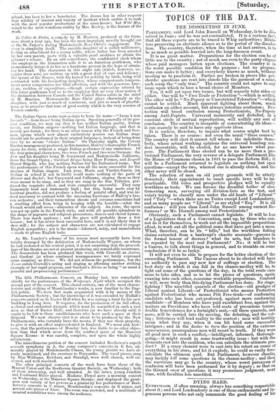Oatrto ttn Vttotr.
Every now and then a problem starts up in the practical theatrical world. A want is felt, which no one exactly knows how to express, but yet it is clearly perceived that an item is deficient in the metropolitan bill of theatrical fare. We do not mean the want of a theatre, of which the poet, not the speculator or actor, shall be the manager ;
nor the want of an English national opera ; nor the want of a government subvention ; nor the want of some mystic dramatic tem- ple, in which plays now deemed unactable shall be transformed into acknowledged stage classics : for of these wants, the persona whom we designate the practical theatrical world know absolutely nothing. Their' philosophyphosophy is purely inductive ; and when they find a state of things ab- normal, the norm by which they judge is taken simply from their own external observations, and is not suggested by any birth of their brains or their hearts.
This particular world—the only world which pays, be it remem- bered, for the theorists are all on the free list—must for some time past have missed the class of piece which gives a distinctive elm- meter to the Adelphi Theatre —that mixture of murder and mirth, clearness and tangle, homeliness and spectacle, which at this par- ticular house has always proved attractive, and always will, till sense moral revolution occurs, too frightful to contemplate. The want of an Adelphi piece has generally been felt ; and the problem arose, as it does every now and then, "110w is an Adelphi piece to be got ?" At first it seems as if this were a problem that any one might solve, a problem scarcely worthy the name. The classical dramatist, who has a store of five-act tragedies in his drawer, and talks big of the higher drama, on the strength of his Franklin's Sophoeles, will not supply the deficiency, simply be- cause he does not deign to do so, and therefore leaves the task to the oi iroXXot. But on investigation, it turns out that. the iro)aor are exceed- ingly Aryor, and that in fact, before we can reduce even the known play- wrights of the day to those who have proved themselves able to concoct an Adelphi piece, they must undergo a process of filtration similar to that which was required by the old Venetian constitution to produce the elect- ors of the Doge. For as many years as we feel bound to remember,. the only writers of Adelphi pieces have been Messrs. Buckstone and Parry ; and though these have frequently paused from their labours, the dramatic geniuses who have supplied the gap, with translations from the French or other material, cut no more figure in the history of the esta- blishment than William of Holland or Richard of Cornwall in that of the German Empire.
To this very small committee of Adelphi producers we are enabled now to add the name of Mr. Mark Lemon ; who has all the geniality, popular humour, and knowledge of English stage-effect necessary for his task. His new piece of Sea and Land, though built on the somewhat haeknied foundation of a suspicion of murder, wrongly incurred, gathers freshness from the novelty of the accessories, (tho scene is laid in a smuggling coast-town,) and above all, from the elaborate manner in which the cha- racter of a girl, educated only among desperadoes, has been worked up both by the author and the actress. "Wild Meg," the smuggler's daugh- ter, is depicted with the same intention as the savage boy in Mr. Dickens's "Ghost Story," namely, that of showing the evil that results from a brutalized condition of the humbler orders. She is endowed with surliness, ferocity, and low insolence, but at the same time with a keen feeling for kindness ; and at the conclusion of the piece she dies of a broken heart, because she is the means of bringing to justice a man who, though-he is a diaeolute villain of the "0. Smith" school, has been to her a benefactor. The drama has in other respects that solidity of interest and variety of incident which entitle it to rank with the most popular productions at the same house; but Wild Meg, raised to the most wondrous reality by Mrs. Keeley, is the feature of the work.



























 Previous page
Previous page